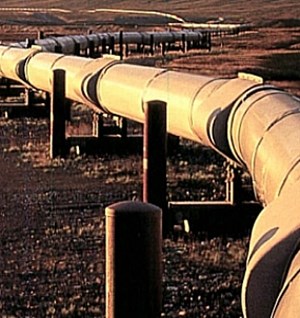Kazakhstan sees oil export disruption resolved by end of April
(Bloomberg) — Kazakhstan expects its main oil-export route via Russia to restore full operations in late April, but remains concerned about the possible impact of Western sanctions or shipping problems on the flow of crude, said Energy Minister Bolat Akchulakov.
The Black Sea shipping terminal for the Caspian Pipeline Consortium halted loadings from two of its three moorings in late March, citing damage from strong storms. About 80% of Kazakhstan’s crude exports are shipped from the facility, which is located on Russia’s Black Sea coast, and the nation has been forced to curtail production as it waits for repairs.
The CPC operator has the necessary spare parts, and the only thing now preventing repairs is bad weather, Akchulakov said. The damaged equipment is not complicated and shouldn’t require lengthy works, he said.
“We set April 15 as an interim milestone, it would be good if they could complete everything by then,” Akchulakov said in an interview. “But they haven’t even started the repairs yet,” so it may take until late April, he said.
On March 24, the minister estimated that the repairs would take no longer than 1 1/2 months.
Some 90% of the crude carried through the CPC link originates in Kazakhstan, with the giant Tengiz, Kashagan and Karachaganak oil projects providing almost all of those volumes. The pipeline also carries some crude of Russian origin, which is injected along its route.
With some countries including the U.S. and U.K. banning imports of Russian oil, and many other buyers reluctant to deal with the country, it is vital that CPC crude isn’t affected, Akchulakov said.
The pipeline is an important oil supplier for Europe so it “needs a special status, allowing it to operate” without being constrained by sanctions targeting Russia, he said. The U.S. ban on Russian oil imports announced in early March did allow companies to continue buying cargoes of Kazakh crude delivered by the CPC pipeline.
The European Union, U.S., Russia and Kazakhstan need to find “some mutual agreements” on CPC, Akchulakov said.
The value of CPC crude, which is still being delivered from one operational mooring at the terminal, has suffered because of the Ukraine crisis, Akchulakov said. It is trading at an unusual discount to benchmark prices because of shipping risks associated with Russian ports, he said.
Kazakhstan expects to have more clarity on the progress of repairs at the shipping terminal around April 20 to 25, Akchulakov said. Should the repair works last into May, “this won’t be good,” he said.
In the event that the CPC pipeline wasn’t able to resume full operations this year, Kazakhstan would have to cut its 2022 oil production plan by around 2.5 million tons, from previous expectations of 87.5 million tons, according to Akchulakov. The single undamaged mooring at the terminal allows the loading of about 110,000 tons a day of Kazakh crude, he said.
If necessary, Kazakhstan could reroute as much as 1 million tons of crude a month from the CPC link. Tengizchevroil is already using all the tank-rail cars it could find to ship about 180,000 tons of oil a month over land to Georgia’s Black Sea port of Batumi, Akchulakov said. The Atyrau-Samara link to Russia could carry as much as 200,000 to 300,000 tons more in April, and the eastbound Atyrau-Kenkiyak pipeline and the port of Aktau on the Caspian Sea could each deliver an additional 250,000 tons a month, he said.



